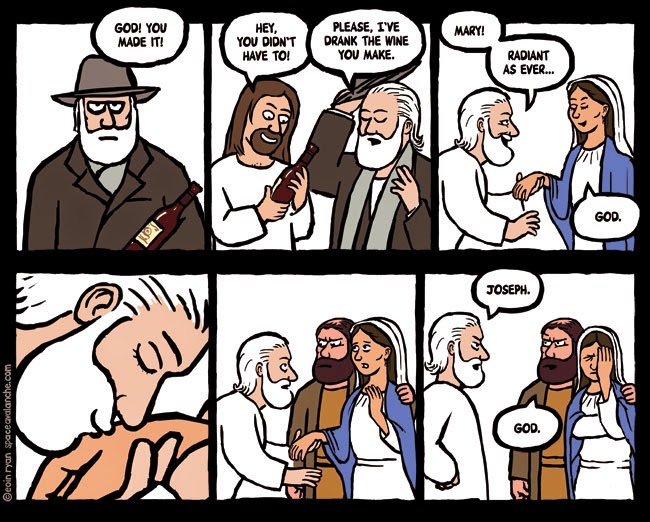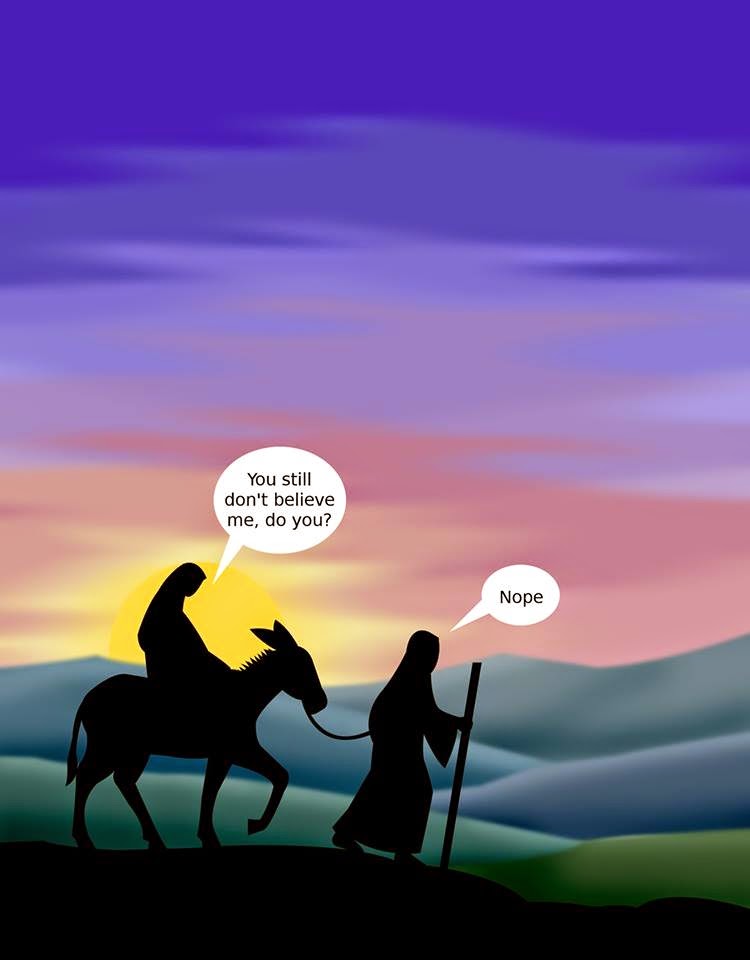“My Soul Doth Magnify the Lord”
Luke 1; Matthew 1
LDS manual: here
Purpose
To explain why the gospel accounts are not reliable, and to remind readers that God is pretty much a rapist.
Reading
We’re starting to dip our toes into the origin story of Christianity here. However, as we’ll see, there are reasons to think that the story has been contaminated by earlier texts, as well as popular notions about gods, virgins, and the sex between them.
Main ideas for this lesson
The where and when of the Gospels
As a believer, I had a rather naïve view of the four gospels (Matthew, Mark, Luke, and John). I always thought that they were each written by a single author, more or less at the time of the events they described. You know, plus or minus a few months.
I should have known better, especially after reading these words from Luke:
Luke 1:1 Forasmuch as many have taken in hand to set forth in order a declaration of those things which are most surely believed among us,
1:2 Even as they delivered them unto us, which from the beginning were eyewitnesses, and ministers of the word;
1:3 It seemed good to me also, having had perfect understanding of all things from the very first, to write unto thee in order, most excellent Theophilus,
1:4 That thou mightest know the certainty of those things, wherein thou hast been instructed.
Notice that the writer of Luke says that at this point in history, many people have written their own histories of Jesus. In writing his version, Luke is just mopping up.
So when were these accounts of Jesus written?
To answer this question, let’s start with this video featuring Matt Dillahunty, answering a question from a caller.
Ask: What points does Matt make?
Answers:
- The Gospels were written decades after the events they discuss
- Conservative scholars habitually date the Gospels early
- It’s not a debate we even need to get into because even if someone had written the gospels down at the time, it wouldn’t mean that the events actually happened.
In the video, Matt mentions this site, earlychristianwritings.com (which is not offline; it’s still going strong).
Class activity: Browse the front page of earlychristianwritings.com. Which books came before the first gospels?
Answer: Most of the Pauline epistles. It’s almost as though the effort for the first half of the century went into administration, and putting the story of Jesus into writing was an afterthought. This is striking to me, because we’re eventually going to see the same pattern for Joseph Smith’s “First Vision”, which didn’t seem to be a part of early church mythology, and didn’t see a coherent write-up until much later.
Ask: According to the website, when do the four gospels appear?
Answers:
- Matthew: 80–100 CE
- Mark: 65–80 CE
- Luke: 80–130 CE
- John: 90–120 CE
Wikipedia’s page on the gospels doesn’t differ significantly on timing. (Notice that Mark is the first gospel to be written. Current thinking has it that whoever wrote Matthew and Luke were copying from Mark. Check out the Wikipedia page for Mark, in particular the Two-Source Hypothesis.)
That’s right; it’s possible that the gospels could have been written down a full century after the events they were describing. How reliable does this make them?
Stories can grow up very quickly. As I write this, the Islamist attack on the cartoonists of the French magazine Charlie Hebdo is still news, and predictably, conspiracy theories have already grown up around the event. In the last decade and a half, the body of ideas known as 9/11 Trutherism has grown up, reached a kind of apex, and dwindled back down to background levels. It doesn’t take long for these movements to coalesce.
So when we read these gospels, it’s important to remember that these documents were not written by eyewitnesses in any traditional sense. The writers had time to confabulate, and borrow whatever legends were current among the people. Christianity had a long time to get its origin story straight.
Is eyewitness testimony reliable?
Luke also says that he is an eyewitness of the events in the Gospels.
Luke 1:2 Even as they delivered them unto us, which from the beginning were eyewitnesses, and ministers of the word;
For many Christians I’ve talked to, this is the key to the whole thing. The gospels were written by eyewitnesses who saw the whole thing, and for them this is very convincing.
But eyewitness accounts are not all they’re cracked up to be. Here’s Sam Harris explaining why.
Starting at 3:14.
Consider Christianity. The entire doctrine is predicated on the idea that the Gospel account of the miracles of Jesus is true. This is why people believe Jesus was the son of God, divine, etc. This textual claim is problematic because everyone acknowledges that the gospels followed Jesus’ ministry by decades and there is no extra-biblical account of his miracles. But the truth is quite a bit worse than that. The truth is even if we had multiple contemporaneous eyewitness accounts of the miracles of Jesus, this still would not provide sufficient basis to believe that these events actually occurred.
Well, why not? Well, the problem is that firsthand reports of miracles are quite common, even in the 21st century. I have met literally hundreds at this point of Western-educated men and women that think that their favorite Hindu or Buddhist guru has magic powers. The powers ascribed to these gurus are every bit as outlandish as those ascribed to Jesus. Now, I actually remain open to evidence of such powers. But the fact is that people who tell these stories desperately want to believe them. All, to my knowledge, lack the kind of corroborating evidence we should require before believing that nature’s laws have been abrogated this way. And people who believe these stories show an uncanny reluctance to look for non-miraculous causes. But it remains a fact that yogis and mystics are said to be walking on water, and raising the dead, and flying without the aid of technology. Materializing objects, reading minds, foretelling the future. Right now, in fact all of these powers have been assigned to Satya Sai Baba the South Indian guru, by an uncountable number of eyewitnesses. But he even claims to have been born of a virgin, which is not all that uncommon a claim in the history of religion.
The psychologist Elizabeth Loftus has done decades of research investigating the reliability of memory. A famous experiment showed how language can influence our memories of events we’ve seen.
In this experiment, participants watched a video of a car crash. They were then asked, “About how fast were the cars going when they (smashed / collided / bumped / hit / contacted) each other?” Some subjects got the version of the question with the word ‘hit’, others ‘smashed’, and so on. What Loftus found was that the subjects’ estimates of the cars’ speed depended on the verb they’d heard — contacted v hit, for example.
Loftus also found that when people were asked the ‘smashed’ version of the question, they were more likely to imagine that they’d seen broken glass, when there was none.
These experiments and others should serve as a caution to us when people come with ‘eyewitness testimony’. People can be mistaken, people can be wrong, and people can lie. And when the stories don’t even come from eyewitnesses, but are written decades after the fact — as is the case with the gospels – this gives us even less reason to believe the extraordinary claims therein.
Female consent is not a high priority for God
The worrying thing about the story of Jesus’ conception is that Mary’s consent is not required. It starts when as angel informs Mary that God’s going to do her:
Luke 1:30 And the angel said unto her, Fear not, Mary: for thou hast found favour with God.
1:31 And, behold, thou shalt conceive in thy womb, and bring forth a son, and shalt call his name JESUS.
Valerie Tarico writes a great piece in the IEET called It’s Not Rape If He’s a God — Or Thinks He Is. She gives a laundry list of gods who have had sex with human women (allegedly), and comments:
But these encounters between beautiful young women and gods have one thing in common. None of them has freely given female consent as a part of the narrative. (Luke’s Mary assents after being not asked but told by a powerful supernatural being what is going to happen to her, and she responds with language emphasizing the power differential. “Behold the bond slave of the Lord: be it done to me . . .”)
Who needs consent, freely given? If he’s a god, she’s got to want it, right? That is how the stories play out.
Yes, it is, and this should bother us a lot more than it does. The low priority assigned to female consent goes hand in hand with other ways in which Christianity promotes rape culture. This includes the cult of modesty so prevalent in Mormonism; young women are encouraged to take responsibility for the sexual thoughts of young men — don’t become walking pornography. How will Mormonism (or Christianity) ever be able to encourage men to take consent seriously, when their god is running around boffing teens? How can sexual abuse be addressed, when there’s a sexual relationship with a huge power differential written right into Christianity’s origin story? It starts here.
Additional lesson ideas
Born of a virgin?
Christians find justification for the virgin birth story in the alleged prophecy of Isaiah:
Isa. 7:14 Therefore the Lord himself shall give you a sign; Behold, a virgin shall conceive, and bear a son, and shall call his name Immanuel.
Let’s ignore the fact that Jesus was never called Immanuel in the NT. The real problem is the mistranslation of the Hebrew word almah ‘young woman’ as ‘virgin’. Paul, writing before the gospels, doesn’t mention a virgin birth, and this might mean that the idea hadn’t taken yet. The book of Matthew contains the first reference to this notion, but Matthew’s a bit of an outlier. Other books don’t make reference to a virgin birth — check our Bart Ehrman’s blog and Valerie Tarico’s article in Alternet for some interesting explanations for this.
Did God have sex with Mary?
Mormons seem to have settled on a peculiar angle on Jesus’ conception: that God and Mary knocked boots. Or at least, this is a point that non-Mormon Christians seemed eager to dredge up with me as a missionary. I was always open to the possibility myself, not being particularly sex-negative. If you go with the Mormon idea that God is a literal man of humanoid form, white skin, about 6’2″, with a godly dong, then godly sex is not out of the question. On the other hand, I thought the question bespoke a kind of inappropriate curiosity.
And yet, as recently as the 80s, the Gospel Doctrine manual used this quote from Ezra Taft Benson, which stops just short of saying, “They totally did it.”
I am bold to say to you, … Jesus Christ is the Son of God in the most literal sense. The body in which He performed His mission in the flesh was sired by that same Holy Being we worship as God, our Eternal Father. He was not the son of Joseph, nor was He begotten by the Holy Ghost. He is the Son of the Eternal Father!
There you go, folks. God is Jesus’ father in the most sticky, sweaty, slippery sense.
I have a funny memory of teaching this Gospel Doctrine lesson as a missionary (I don’t think that was a normal thing, but I tried to serve where needed), and reading this quote out. I figured at the time that it was a coded reference to coitus divinus, and maybe I wanted to see who knew what was what. Let them who have ears to hear, and all that. And who do you think connected with it? The mission president’s wife. Yep, she caught the reference, and nodded sagely. She was into it. Odd.
If you want to see a list of references from the semi-official Mormon canon, here it is. Caution: Christianity, Web 0.9 design, animated gifs.
Be that as it may, the coital liaison between God and Mary did make for awkward dinner parties.
The idea of gods having sex with human women is incredibly popular throughout history. RationalWiki has a big list. You must admit, it’s a tempting option for a girl in trouble. In the Amazon, a girl has (or had) the option of blaming dolphins who turn into men.
Tribal elder: Who’s the father?
Girl: Um, a dolphin!
Tribal elder: Sounds legit.
Every guy in the tribe: Phew!
There are a number of closely-related cartoons that mine the humour of this situation. Here they are.
This one’s so popular, it comes in two varieties.
Where’d Joseph get a typewriter, anyway?
This one is my favourite, though.
Now I’m definitely going to hell.










Recent Comments